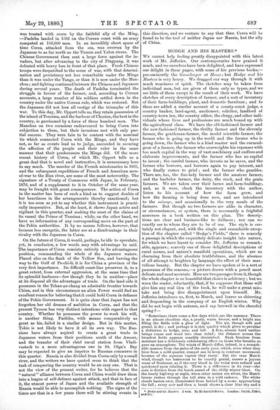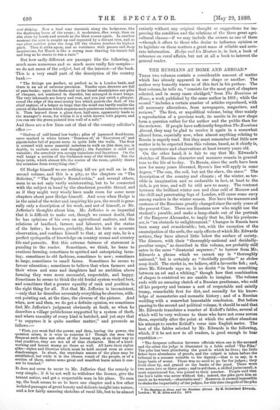HODGE AND HIS MASTERS.* WE cannot help feeling greatly disappointed
with this latest work of Mr. Jefferies. Our contemporaries have praised it
much, and we ourselves have been delighted, and have expressed our delight in these pages, with some of his previous books,— pre-eminently the Gamekeeper at Home; but Hodge and his Madera is very heavy. We dragged our way through it with much weariness of spirit. The sketches may be taken from
individual men, but are given of them only as types, and we see little of them except in the result of their work. We have sketches of every description of farmer, and a sort of inventory of their farm-buildings, plant, and domestic furniture ; and to these are added a similar account of a county-court judge, a country banker, land-agent, auctioneer, solicitor, landlord of country-town inn, the country editor, the clergy, and other indi- viduals whose lives and professions are much bound up with the agricultural class. We have the old-fashioned farmer and the new-fashioned farmer, the thrifty farmer and the slovenly farmer, the gentleman-farmer, the model scientific farmer, the farmer who is going up in the world and the fernier who is going down, the farmer who is a kind master and the curmud- geon of a farmer, the farmer who overweights his expenses with' too much capital in the way of vast machinery and endless and elaborate improvements, and the farmer who has no capital to invest ; the careful farmer, who invests as he saves, and the farmer who borrows, and borrows again to pay interest, and.
who finally comes to grief ; and the farmer who gambles.
There are, too, the fine-lady farmer and the amateur farmer, and the bachelor farmer, the dairy, the stock, and the grain farmers. We are taken over their farms and farm-buildings, and, as it were, check the inventory with the author, listen to his account of how the farm grew, and how the farming is being done now, and are introduced to the minage, and occasionally to the very meals of the farmers. But though no two farmers are alike in character,. or circumstances, or system, there is necessarily a frightful sameness in a book written on this plan. The descrip- tions are clear and business-like to dullness ; nor can we exactly see to whom they are to be of use. The style is cer- tainly not elegant, and, with the single and remarkable excep- tion of the chapter called "Hedge's Fields," there is scarcely a passage in which the exquisitely delicate insight into nature, for which we have learnt to consider Mr. Jefferies so remark- able, appears ; scarcely one of those delightful descriptions of rural scenes, and nature's manifold operations, which are so charming from their absolute truthfulness, and the absence of all attempt to heighten by language the effect of their mar- vellous beauty. But the chapter we have spoken of is a sort of panorama of the seasons,—a picture drawn with a. pencil most delicate and most accurate. Here are two passages from it, though the whole chapter is so beautiful that choice is arbitrary ; but we warn the reader, reluctantly, that, if he supposes that these will give him any real idea of the book, he will make a great mis- take and bring dire disappointment upon himself. Mr.
Jefferies introduces us, first, to March, and leaves us shivering and desponding in the company of an English winter. Why did he not begin with autumn, and say farewell in the cheerful spring P-
" Sometimes there come a few days which aro like summer. There is an almost cloudless sky, a gentle, warm breeze, and a bright sun filling the fields with a glow of light. The air, though soft and genial, is dry ; and perhaps it is this quality which gives so peculiar a definition to hedge, tree, and hill. A firm, almost hard outline brings copse and wood into clear relief; the distance across the broadest fields appears sensibly diminished. Such freedom from moisture has a deliciously exhilarating effect on those who breathe so pure an atmosphere. The winds of March differ, indeed, in a remark- able manner from the gales of the early year, which, even when they blow from a mild quarter, compel one to keep in constant movement because of the aqueous vapour they carry. But the true March, wind, though too boisterous to be exactly genial, causes a joyous sense of freshness, as if the very blood in the veins were refined and quickened upon inhaling it. There is a difference in its roar—the note is distinct from the harsh sound of the chilly winter blast. On the lonely highway at night, when other noises are silent, the March breeze rushes through the tall elms in a wild cadence. The white clouds hasten over, illuminated from behind by a moon approaching the full ; every now and then a break shows a clear blue sky and a • Hodge and his Masters. 2 vol.. By Richard Jefferies. London : Smith, Elder, and Co.
star shining. Now a loud roar resounds along the hedgerow, like the deafening boom of the surge ; it moderates, dies away, then an elm close by bends and sounds as the blast comes again. In another moment the note is caught up and repeated by a distant tree, and so one after another joins the song till the chorus reaches its highest pitch. Then it sinks again, and so continues with pauses and deep inspirations, for March is like a strong man drawing his breath full and long as he starts to run a race."
But how sadly different are passages like the following, so much more numerous and so much more really fair samples—
we do not mean of the subject, but of the interest—of the book. This is a very small part of the description of the country bank :—
" The fittings are perfect, as perfect as in a London bank, and there is an air of extreme precision. Yonder open drawers are full of pass-books ; upon the desks and on the broad mantelpiece are piles of cheques not scattered in disorder, but arranged in exact heaps. The very inkstands are heavy and vast, and you just catch a glimpse, round the edge of the semi-sentry box which guards the desk of the chief cashier, of a ledger so huge that the mind can hardly realise the extent of the business which requires such ponderous volumes to record it. Then beyond these a glass door, half-open, apparently leads to the manager's room, for within it is a table strewn with papers, and you can see the green-painted iron wall of a safe."
And these arc a few lines out of that of the country solicitor's office :—
" Shelves of calf-bound law books ; piles of japanned deed-boxes, some marked in white letters Trustees of,' or Executors of,' and pigeon-holes full of papers seem to quite hide the walls. The floor is covered with some material noiseless to walk on (the door, too, is double, to exclude noise and draught) ; the furniture is solid and valuable; the armchair you occupy capacious and luxurious. On the wall hangs a section of the Ordnance map of the district. But the large table, which almost fills the centre of the room, quickly draws the attention from everything else."
Of Hodge himself we see nothing till we get well on in the second volume, and this is a pity, as the chapters on "The Solicitor," "The Squire's Round-robin," and several others, seem to us not only vastly uninteresting, but to be connected with the subject in hand by the slenderest possible thread, and as if they might very wisely have made room for some more chapters about poor Hodge himself. And even when Hodge is in the mind of the writer and inspiring his pen, the result is gene- rally only a description of his work, and not of himself, or Mr. Jefferies's thoughts about him. Mr. Jefferies is so impartial that it is difficult to make out, though we cannot doubt, that he has opinions of his own on agricultural matters, and the relations of landlord, farmer, and labourer, and the status of the latter ; he knows, probably, that his forte is accurate observation, and confines himself to that; at any rate, he is a perfect cyclopedia of knowledge on country scenes and country life and pursuits. But this extreme fairness of statement is puzzling to the reader. Sometimes, we think, he leans to cautions farming, sometimes to spirited and enterprising farm- ing; sometimes to old fashions, sometimes to new; sometimes to large, sometimes to small farms. Sometimes he seems to favour education ; sometimes to believe that when farmers and their wives and sons and daughters had no ambition above farming they were more successful, respectable, and happy. Sometimes he seems to think the old feudal system worked best, and sometimes that a greater equality of rank and position is the right thing for all. Not that Mr. Jefferies is inconsistent, —only that he describes accurately everything he observes, with- out pointing out, at the time, the obverse of the picture. And when, now and then, we do get a definite opinion, we sometimes find_ Mr. jefferies's judgment obviously at fault, as when be describes a village publichouse supported by a system of theft, and where rascality of every kind is hatched, and yet says that "to suppress it is quite another matter," and proceeds as follows :—
"First, you must find the power, and then, having the power, the question arises, is it wise to exercise it P Though the men who frequent such dens are often of the lowest type, or on their way to that condition, they are not all of that character. Men of a hard- working and honest stamp go there as well. All have their rights alike—rights and liberties which must be held sacred even at some disadvantage. In short, the reprobate nature of the place may be established, but while it is the chosen resort of the people, or of a
section of them, unless some great and manifest harm arises it can- not be touched."
It does not seem to occur to Mr. Jefferies that the remedy is very simple ; if it be not well to withdraw the licence, give the tenant notice, and get a respectable man in his place. To sum up, the book seems to us to have one chapter and a few other isolated passages of great beauty and delicate insight into nature, and a few fairly amusing sketches of rural life, but to be almost entirely without any original thought or suggestions for im- proving the condition and the relations of the three great agri- cultural classes—if we may include the owners as one of them —though it offers to those who desire to influence opinion or to legislate on these matters a great mass of reliable and accu- rate information. Hodge and his Masters is, in fact, a book of reference on rural affairs, but not at all a book to interest the general reader.



































 Previous page
Previous page